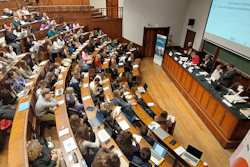Empowering citizens. Saving lives.
Leuven is a neighbouring city of Belgium’s capital Brussels. It is a city with historical grandeur still visible today in its architecture. And Leuven is a modern and buzzing city, not least because around 50,000 students are living there who make up roughly one third of the city’s population.
In this episode we talk about a very important topic: medical emergencies, and in particular out-of-hospital cardiac arrests. Belgium sees 10,000 people each year suffering cardiac arrest, and the country is slower to respond in these emergencies than some other EU member states.
Our Una Europa partner university KU Leuven, who is preparing for its 600-year anniversary in 2025, launched a competition and asked students, staff and the citizens of Leuven to vote on a project which most adequately shows the importance of science for society. The selected project is called 'From Bystander to Hero' and it brings together researchers, medical experts and volunteer citizens to improve the first responder system in case of medical emergencies.
Listen to this episode and learn more about the project and why citizen engagement is crucial for its success. And find out how you can make a difference in medical emergencies.
" Through cell phone technology, we can ensure that [citizen volunteers] can be called if they're close to the incident. They can arrive within three minutes and already perform first steps, which are – this has been proven in several European countries – live-saving. "
Prof. Marc Sabbe
Emergency physician, UZ Leuven




